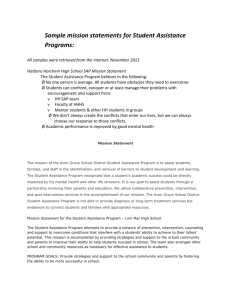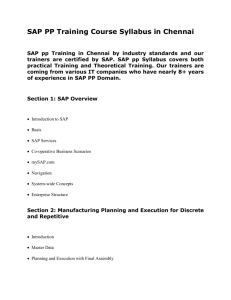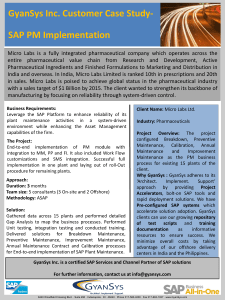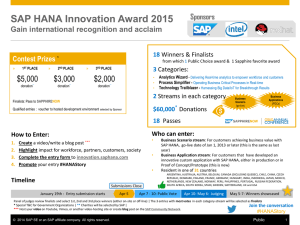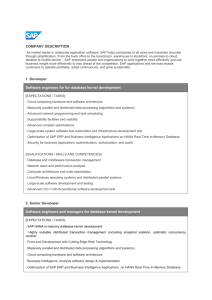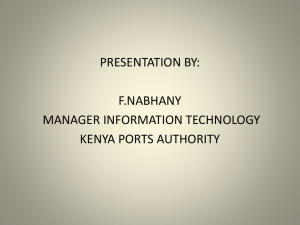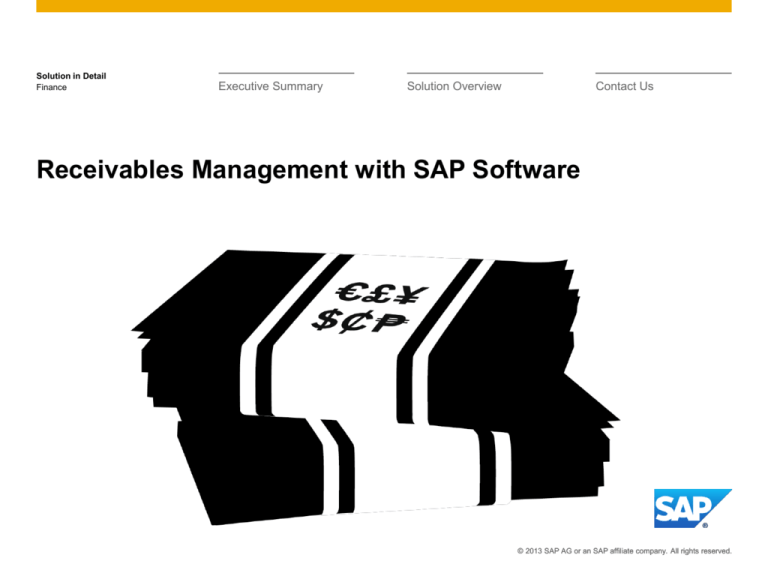
Solution in Detail
Finance
Executive Summary
Solution Overview
Contact Us
Receivables Management with SAP Software
© 2013 SAP AG or an SAP affiliate company. All rights reserved.
Executive Summary
Solution Overview
Contact Us
Improve Cash Flow and Reduce Write-Offs
Better Cash Flow
Improved Efficiency
Managed Working Capital
Today’s receivables managers have to constantly balance the need to decrease
days sales outstanding (DSO) and bad debt write-offs while maintaining a superior
level of customer service. They are responsible for ensuring that cash is on hand to
fund business operations and new growth opportunities. And they have to do all
this at low cost to deliver on margin goals.
SAP Innovations
Receivables management is a complex and
often labor-intensive process that’s being made
even more difficult by the fact that customer
credit risk has increased because of global
economic volatility.
26%
Fewer overdue accounts
receivable when receivables
systems are fully integrated to
billing systems
But the challenges go beyond credit risk.
Process inefficiencies in existing market
solutions are common, resulting in more bad
debt write-offs, longer DSO, higher costs, and
increased error rates. And past-due accounts
threaten cash flow and working capital
management while limiting the ability for a
business to grow without external funding
sources.
In addition, while accounts receivable managers
need to collaborate internally and externally,
their existing collaboration tools may not allow
them to, for instance, give sales teams up-todate information about customer accounts and
untapped credit lines. Solutions also have to
give customers anytime access to information
and support high-quality service. Lean finance
departments must automate interactions and
enable management by exception in customer
dealings – from managing customer credit risk
to dealing with billing disputes.
Source: SAP Performance
Benchmarking
2 / 30
© 2013 SAP AG or an SAP affiliate company.
All rights reserved.
Executive Summary
Solution Overview
Contact Us
Automation Improves Efficiency and Effectiveness
Better Cash Flow
Improved Efficiency
Managed Working Capital
A receivables management team manages financial interactions with customers –
but in most cases, these teams are constantly under pressure to do more with less.
Automating key aspects of receivables processes can free receivables management professionals to focus on providing exceptional support for internal and
external business partners.
SAP Innovations
Best-Run Financial
Service Providers
Receivables teams want to streamline the
entire order-to-cash process, from customer
order entry and billing to dispute resolution and
collections. To do this, they need to implement
a company-wide credit policy that helps ensure
that each customer transaction is cleared
against a limit that reflects the current creditworthiness of the customer. At the same time,
they must give customers online access to their
bills.
When handling billing disputes, receivables
teams need a way to orchestrate the flow of
information throughout their company until a
3 / 30
resolution is found. At the same time,
collections teams need to take a proactive,
strategy-based approach to contacting
customers about overdue receivables.
SAP software supports and streamlines all of
these activities and optimizes the flow of
financial information internally and with
partners. At the same time, SAP collaboration
tools help receivables managers work with
sales professionals to provide superior
customer service and decrease DSO.
© 2013 SAP AG or an SAP affiliate company.
All rights reserved.
Executive Summary
Solution Overview
Contact Us
Manage Working Capital to Enable Growth
Better Cash Flow
Improved Efficiency
Managed Working Capital
SAP Innovations
For receivables management teams, the business benefits of effectively managing
working capital are enormous. As external financing costs continue to increase,
companies must tap into their receivables and convert them into cash to run and
grow their business. SAP solutions help best-run companies use automation to
establish best-in-class receivables operations while improving their bottom line.
SAP solutions are helping customers:
Improve days sales outstanding
Reduce bad debt write-offs
Minimize error rates on bills
25%
Accelerate dispute resolution
Lower accounts receivable
write-offs when receivables
are integrated with credit,
billing, and collection systems
Source: SAP Performance
Benchmarking
4 / 30
© 2013 SAP AG or an SAP affiliate company.
All rights reserved.
Executive Summary
Solution Overview
Contact Us
SAP Innovations
Better Cash Flow
Improved Efficiency
Managed Working Capital
SAP Innovations
SAP software for receivables management leverages the latest technology
innovations to enable fast responses to market dynamics and real-time visibility into
receivables. The always-on, anywhere access to information and processes
empower receivables managers to collaborate and work smarter. And low-cost,
low-risk, scalable, flexible deployment options help companies work with people
outside of the accounting department to improve their cash position.
Database and technology solutions powered by
the SAP HANA platform enable receivables
managers to monitor and analyze high volumes
of customer transactions.
Powerful, tailored analytics tools help management better organize receivables teams and
determine which strategies work best for their
business. Managers can focus their teams on
a subset of key customers driving credit risk or
tying up significant amounts of cash in disputes. Managers can also investigate drivers
of changes in working capital from a DSO
perspective and make policy changes.
5 / 30
SAP also provides mobile solutions that give
finance professionals always-on access to
status reporting and exceptions and alerts,
enabling quick responses, better decision
making, and fewer risks to customer service.
Mobile solutions extend financial data and
processes to business users, especially to
sales executives – for example, so they can
see unpaid invoices and disputes underway.
They can discuss issues in person with
customers and provide better service. For
finance, this helps ensure quick resolution of
billing disputes and better liquidity planning.
© 2013 SAP AG or an SAP affiliate company.
All rights reserved.
Executive Summary
Solution Overview
Contact Us
Accelerate Receivables Management
Solution Overview
Accounts Receivable
Accounts Receivable
Manage all financial accounting–related aspects of customer accounts receivable.
Credit Management
Billing and E-Invoicing
Credit Evaluation and Management
Embed proactive credit management in transactional processes and portfolio
analysis.
Dispute Resolution
Collections Management
Billing and E-Invoicing
Deploy a customer bill payment portal or an e-billing process.
Receivables Management
Why SAP?
Dispute Resolution
Clarify and resolve customer payment disputes quickly and efficiently.
Collections Management
Proactively manage customer collections and customer service.
6 / 30
© 2013 SAP AG or an SAP affiliate company.
All rights reserved.
Executive Summary
Solution Overview
Contact Us
Receivables Management
Solution Overview
Accounts Receivable
Credit Management
Accounts
Receivable
Credit
Evaluation and
Management
Billing and
E-Invoicing
Dispute
Resolution
Collections
Management
Create Due Item
Check Credit
Create Sales Order
and Due Item
Create Dispute Case
Present Due Item
Assign Credit Limit
Create Invoice Pool
Resolve Dispute
Case
Prioritize Overdue
Receivables
Release Blocked Sales
Order
Present or Send
E-Invoice
Release Blocked
Sales Order
Receive Customer
Payment
Billing and E-Invoicing
Dispute Resolution
Collections Management
Finance
Receivables Management
Process Incoming
Payment
Collect Overdue
Receivables
Why SAP?
Receivables management
applications from SAP
address all key cross-industry
needs for managing the
order-to-cash process for
businesses.
Sales
Process Customer Service Inquiries
7 / 30
© 2013 SAP AG or an SAP affiliate company.
All rights reserved.
Executive Summary
Solution Overview
Accounts Receivable
Capabilities
Benefits
SAP Innovations
0.4%
Average finance costs relative
to company revenue of
top-quartile performers
(compared to over 1.2% for
bottom quartile)
Source: SAP Performance
Benchmarking
Solution Overview
Contact Us
Effectively Managing Accounts Receivable with
SAP Software
Automated, integrated accounts
receivable processes support the orderto-cash process in the SAP ERP
application, giving managers real-time
insight into receivables portfolios and
working capital. They can work more
efficiently and make better, faster
decisions.
With SAP software, accounting organizations
can record and manage accounts receivable
data for all customers. Automated processes
reduce manual effort and lower the cost
associated with running this critical financial
process.
For example, postings to accounts receivable
are triggered in response to operative transactions in sales and logistics and simultaneously
8 / 30
recorded in the general ledger. Customer line
items are automatically cleared when the
incoming payment is received by the system.
And receivables data can be integrated with
dispute, collections, and credit management
applications to reduce manual effort and lower
the costs associated with these processes.
© 2013 SAP AG or an SAP affiliate company.
All rights reserved.
Executive Summary
Solution Overview
Accounts Receivable
Capabilities
Benefits
SAP Innovations
57%
Lower finance cost as a
percentage of revenue
for automated versus
unautomated companies
Source: SAP Performance
Benchmarking
Solution Overview
Contact Us
Make Accounts Receivable (A/R) the Backbone of
Order to Cash
SAP software includes an accounts receivable
module that is central to managing all billingrelated interactions throughout the order-tocash process. Initially, it enables outgoing
invoices or bills to be posted, organized, and
viewed by respective customer accounts.
The software’s payment handling and clearing
module plays a key role in the A/R process as
well. Incoming payments can be posted manually or using automated rules. Customer
transactions involving down payment requests
can be managed. Received down payments
are cleared automatically.
And finally, mobile reporting functionality gives
managers insight into the status of their
receivables portfolio. A mobile app for sales
executives makes accounts receivable
information accessible anytime, anywhere.
The accounts receivable module lays the
foundation for effective management of credit,
collections, and disputes by providing a single,
unified view of customer outstanding amounts.
This information is readily available for
analysis.
9 / 30
© 2013 SAP AG or an SAP affiliate company.
All rights reserved.
Executive Summary
Solution Overview
Accounts Receivable
Capabilities
Benefits
SAP Innovations
70%
Of leading companies
integrate billing and
collections with order entry
and credit, with no duplicate
data entry
Source: Aberdeen Group,
August 2012
Solution Overview
Contact Us
An Integrated Approach Reduces Costs and Helps
Ensure Data Quality
SAP software includes an accounts
receivable module for processing all
customer receivables. The integrated
approach to logistics, sales, dispute,
collections, and credit management
keeps data synchronized, reduces error
risk, lowers audit costs, and helps
everyone understand the value of
customer relationships.
Taking an integrated approach to receivables
results in both operational and compliance
advantages. For example, automating postings,
enabling self-service, and providing mobile
access to key receivable information lower the
operational load of the finance department
while reducing costs. Companies can also
reduce DSO by giving accounts receivable
teams insights into outstanding customer
positions during customer interactions.
At the same time, automation eliminates
manual, error-prone processes and supports
compliance and risk management. Automation
also reduces audit costs because it helps to
standardize and document processes.
Finally, companies can improve customer
satisfaction by giving their accounting team and
sales representatives fast access to real-time
information about the status of their inquiries.
10 / 30
© 2013 SAP AG or an SAP affiliate company.
All rights reserved.
Executive Summary
Solution Overview
Contact Us
Innovations for Accounts Receivable
Solution Overview
Accounts Receivable
Capabilities
Benefits
SAP Innovations
68%
Of leading companies utilize
performance dashboards to
support their strategic actions
Source: Aberdeen Group,
August 2012
Technology is pushing businesses
faster than ever before. The pace of
transaction processing is accelerating.
Whether in the area of mobile, in-memory
processing, or next-generation analytics,
SAP innovations are driving changes in
how traditional accounts receivable processes are managed.
Big Data
SAP HANA revolutionizes the handling of
incoming bank statement items and improves
unstructured searches, boosting the productivity of clerks.
Receivables Manager mobile app combines
SAP HANA and mobile functionality to give
managers insight into their customer base
and help them focus on where to reduce
receivables risk.
Mobile
The SAP Customer Financial Fact Sheet
mobile app extends accounts receivable
information to the sales force – including credit
limit utilization, outstanding invoices, and
disputes – to drive down DSO. The SAP
Analytics
The DSO scope of the SAP Working Capital
Analytics analytic application allows managers
to drill down into the drivers of change for
working capital.
11 / 30
© 2013 SAP AG or an SAP affiliate company.
All rights reserved.
Executive Summary
Solution Overview
Contact Us
Credit Evaluation and Management
Solution Overview
Credit Management
Capabilities
Benefits
SAP Innovations
10%
Decrease in bad debt writeoffs by enforcing global
proactive credit management
policies
Source: SAP Performance
Benchmarking
SAP gives accounts receivable teams
the tools they need to control the risk
of nonpayment through real-time credit
allocation based on internal and external data. Process management tools
help teams monitor and automate credit
application and approval processes to
accelerate and improve credit decisions
across the enterprise.
The SAP Credit Management application helps
companies manage and monitor credit limits
and risk from a single platform for all of their
business. The integration of credit management
functions with key transactional processes
helps ensure that corporate credit policies are
enforced for every deal. Automation of credit
application and approval processes accelerates
processing time while minimizing time and
effort, reducing credit-blocked orders. And
support for real-time credit allocations and
better insight and monitoring help finance
reduce credit exposure. Using a combination of
internal data, such as payment behavior, and
externally sourced data leads to analyses that
help companies adapt quickly to changing
market conditions.
The result is a proactive credit management
process for evaluating credit before prices and
sales are confirmed. Managers can also view
all credit risk being carried by the organization
and manage accordingly.
12 / 30
© 2013 SAP AG or an SAP affiliate company.
All rights reserved.
Executive Summary
Solution Overview
Contact Us
Enable Predictive Credit Evaluations
Solution Overview
Credit Management
Capabilities
Benefits
SAP Innovations
83%
The amount of credit sales
collected within terms by
world-class organizations
Source: The Hackett Group,
September 2012
SAP Credit Management is a proactive and
predictive credit evaluation solution that
enables finance to execute on and manage a
global credit policy – even in a distributed
system landscape. Credit-specific customer
master data is stored using the business
partner function, a flexible data store that can
accommodate information such as financial
ratios for determining credit stores, third-party
data, and more.
The application supports credit checks at
several points within operational sales and
logistics processes. A business document
called a credit case is used to process credit
limit applications in a structured way. The
status and results of credit limit applications are
documented and tracked.
The software includes a credit rules engine that
automatically categorizes customers based on
scoring rules. These automated calculations
assign a customer-specific credit limit, which
may also reflect information from external rating
agencies.
The software also provides role-based access
to credit management information and analysis
tools. For example, corporate credit risk
analysts can monitor credit risk by criteria such
as country or currency. In addition, sales
people can have Web- and mobile-based
access to credit information to avoid sales
order delays and negotiate better.
13 / 30
© 2013 SAP AG or an SAP affiliate company.
All rights reserved.
Executive Summary
Solution Overview
Contact Us
Integrate Credit Management into Every Transaction
Solution Overview
Credit Management
Capabilities
Benefits
SAP Innovations
0.3%
The amount of accounts
receivable write-offs by
the 25% top-performing
companies (compared to
3.1% for the bottom 25%)
Source: ASUG Benchmarks
Taking an enterprise-wide approach to
managing credit risk helps companies
shape their customer portfolio in response to changing market conditions.
Companies can extend credit to customers to facilitate sales while managing
total exposure and reducing bad debt
write-offs.
SAP software supports an integrated approach
to credit evaluation and management that helps
companies limit their credit exposure without
significantly slowing revenue-generating
business processes.
Clearly defined credit limits are automatically
checked by the system at the point of order
entry so that troublesome cancellations can be
avoided. Business workflow regarding creditblocked orders automatically routes approval or
credit extensions without delay. And because
the software automatically calculates credit
limits based on customer financials, external
credit rating agency information, and payment
behavior, finance teams can lower costs and
resource demands. At the same time, finance
profes-sionals can make more reliable credit
decisions and have full documentation of
decisions through automated audit trails. Better
credit decision making, of course, ultimately
leads to fewer bad debt write-offs, which boosts
the bottom line.
14 / 30
© 2013 SAP AG or an SAP affiliate company.
All rights reserved.
Executive Summary
Solution Overview
Contact Us
Innovations for Credit Evaluation and Management
Solution Overview
Credit Management
Capabilities
Benefits
SAP Innovations
82%
Of leading companies have
real-time visibility into
outstanding invoice volumes
Source: Aberdeen Group,
August 2012
SAP innovations give business
managers and sales executives realtime customer credit information to help
them focus on critical customers and
alert sales teams about credit utilization
to aid negotiations. They can instantly
analyze exposures and utilizations to
shape their portfolio.
Big Data
The SAP Receivables Manager mobile app
gives managers real-time insight into customers in various credit segments. Collaboration
tools help teams focus their attention on the
right priorities and trigger further credit analyses, when appropriate.
credit risk class, credit limits, and credit
utilization, to sales executives. Combining this
information with access to sales orders and
invoices, it enables sales executives to
negotiate better with customers and ask for
payments on outstanding invoices to avoid
credit-blocked orders.
Mobile
The SAP Customer Financial Fact Sheet
mobile app extends credit information, including
15 / 30
© 2013 SAP AG or an SAP affiliate company.
All rights reserved.
Executive Summary
Solution Overview
Contact Us
Billing and E-Invoicing
Solution Overview
Billing and E-Invoicing
Capabilities
Benefits
85%
Percent of customer invoices
automatically generated by
world-class companies
Source: The Hackett Group,
September 2012
Using SAP software, finance departments can efficiently create, present,
and send bills to customers. To improve
service levels, the software also
enables customers to access their bills
through a self-service portal, where they
can also make payments electronically.
SAP software integrates accounts receivable,
cash management, and dispute resolution into
the billing and invoicing process. Customers,
customer service representatives, business
managers, and accountants all have access to
the same business documents and status
information. There is no room for misinterpretation, which improves customer
satisfaction.
Using the software, users can generate
invoices two ways: based on sales orders for
each delivery, or collectively. Billing administrators can create and process invoices, credit
memos, debit memos, pro forma invoices, and
cancellation documents. Plus, they can send
bills and invoices electronically, enable online
inquiries, and receive electronic payments
through a customer-facing portal. By effectively
using all of these features, billing organizations
can automate processes, resulting in fewer
errors, faster processing, and better customer
service.
16 / 30
© 2013 SAP AG or an SAP affiliate company.
All rights reserved.
Executive Summary
Solution Overview
Contact Us
Automate Customer Billing
Solution Overview
Billing and E-Invoicing
Capabilities
Benefits
47%
Lower finance costs as a
percent of revenue due to
automation and self-services
Source: The Hackett Group,
2012
SAP software supports the key elements in the
billing and e-invoicing process. The first step is
to generate bills and invoices from back-end
sales, billing, and accounting systems to initiate
the invoicing process with a customer.
Some companies choose to present and send
bills and invoices electronically. SAP software
provides a customer-facing portal that displays
invoice documents in PDF or XML format to
customers. Through this portal, customers have
access to self-service functionality. For
example, customers can see all of their bills
and credit notes on the Internet and download
bill data in PDF or comma-separated values
(CSV) file formats. If items are being disputed,
customers can create a dispute case online.
They can also initiate payments through
various payment methods or download bills into
an accounts payable system.
SAP software also supports e-billing initiatives.
For example, companies can send XML or
electronic data interchange (EDI) data or
digitally signed PDFs to customers, including
compliance checks if required by legal
jurisdiction.
17 / 30
© 2013 SAP AG or an SAP affiliate company.
All rights reserved.
Executive Summary
Solution Overview
Billing and E-Invoicing
Capabilities
Benefits
50%
Of leading companies have
fewer error rates on bills with
automation solutions
Source: SAP Performance
Benchmarking
Solution Overview
Contact Us
Lower Billing Costs While Ensuring Customer
Satisfaction
Automated billing and e-invoicing
processes supported by SAP software
reduce costly, time-consuming errors;
lower invoicing costs; and even help
companies save money on printing and
postage. Companies benefit from
accelerated cash collections and
reduced DSO.
As part of a finance transformation initiative,
finance operations teams can leverage billing
and e-invoicing functions within SAP software
to reduce the cost of operations. Cost savings
are achieved by using SAP software to automate processes, eliminate the need for printing
and postage, and enable customer self-services
to reduce staffing needs. In addition, by automatically generating billing documents and
optimizing invoice transmission, companies
can shorten the invoice cycle time and thus
reduce DSO.
Automation built into billing and e-invoicing
functions can also enhance compliance and
risk management initiatives by eliminating
manual, error-prone processes. Automation
also reduces audit costs, as automated, standardized processes are less time-consuming to
audit. The software also documents a full audit
trail for every transaction. Finally, finance
benefits from more precise cash management
and improved liquidity planning, as the data
flow is automatically pushed into cash management processes supported by SAP ERP.
18 / 30
© 2013 SAP AG or an SAP affiliate company.
All rights reserved.
Executive Summary
Solution Overview
Contact Us
Dispute Resolution
Solution Overview
Dispute Resolution
Capabilities
Benefits
SAP Innovations
56.5%
Lower uncollectible accounts
receivable write-offs (as a
percentage of revenue) with
integrated, automated dispute
management
Source: SAP Performance
Benchmarking
SAP software tracks underpayments
automatically and uses workflow and
escalations so finance professionals
can resolve disputes quickly and
effectively. It also provides centralized
reporting, which finance can use to
identify process weaknesses that are
causing cash to be tied up in disputes.
SAP software automates the creation of dispute
cases related to invoice and payment discrepancies and provides a workflow-based collaborative platform for managing them through to
resolution. The accounts receivable data is
continuously synchronized with the dispute
cases – for example, if a remaining outstanding
amount is received, the dispute case is closed
automatically.
Equally important, using various mobile,
collaboration, and workflow tools, finance can
dispatch dispute cases to resources outside its
team, for example, to the logistics organization
to verify a late delivery. This can vastly accelerate the dispute resolution process, which leads
to happier customers and less cash tied up in
disputes and unavailable to the business. For
the business, this means less cash and time
tied up in disputes and reduced DSO. And for
customers, it means better service and a reason to keep coming back for more business.
19 / 30
© 2013 SAP AG or an SAP affiliate company.
All rights reserved.
Executive Summary
Solution Overview
Contact Us
Clarify Underpayments Faster
Solution Overview
Dispute Resolution
Capabilities
Benefits
SAP Innovations
68%
Of leading companies have
real-time visibility into current
invoice exceptions by
customer and problem type
Source: Aberdeen Group,
August 2012
With dispute resolution functions supported by
SAP software, companies can automate the
creation of dispute cases based on discrepancies between invoices and payments. They
can also give customers self-service access to
the SAP Biller Direct application so they can
create dispute cases. Shared service agents
can log disputes in the SAP Shared Service
Framework software.
Dispute cases are centrally processed and
continuously synchronized with accounts
receivable data, and cases are automatically
closed based on receipts. Collaborative
workflows speed information gathering.
If a claim is justified, finance issues a credit
memo. For short payments, the credited amount
is offset by the residual balance. For nonpayments, the net balance is due after the credit
memo is issued. If a claim is unjustified, an agent
can return it to the collections work list.
Reporting functions help managers identify the
root causes of disputes. Once identified, the
causes can be resolved, lowering the total
numbers of future disputes.
20 / 30
© 2013 SAP AG or an SAP affiliate company.
All rights reserved.
Executive Summary
Solution Overview
Dispute Resolution
Capabilities
Benefits
SAP Innovations
32%
Of customers can access
account information via Webbased applications from
world-class firms (versus 1%
by the peer group)
Source: The Hackett Group,
September 2012
Solution Overview
Contact Us
Reduce the Amount of Working Capital Tied Up in
Disputes
SAP software supports a centralized,
automated approach to disputes that
accelerates resolutions. As a result,
companies have less cash and time tied
up in resolutions, and they can reduce
DSO. And using root cause analysis,
they can identify and address issues
impacting customer satisfaction.
Finance teams benefit from the standardized,
automated approach to dispute management
supported by SAP software in a variety of
ways. Automation lowers the cost of finance by
accelerating dispute creation and information
gathering. Centralized data storage helps
accountants be more effective when fielding
inquiries about the status of disputes. And
mobile-enabled access to dispute information
for sales reps lowers call center volumes.
In addition, companies can reduce DSO by
handling billing disputes faster and increasing
working capital to grow the business. And
automation tools enhance compliance and risk
management; eliminate manual, error-prone
processes; and help ensure more accurate,
compliant data (which is less expensive to
audit). Finally, companies gain a centralized
data repository and way to identify process
inefficiencies that, once addressed, boost
customer satisfaction.
21 / 30
© 2013 SAP AG or an SAP affiliate company.
All rights reserved.
Executive Summary
Solution Overview
Contact Us
Innovations for Dispute Resolution
Solution Overview
Dispute Resolution
Capabilities
Benefits
SAP Innovations
27%
Lower DSO for firms with
A/R systems that track short
payments and alert users
about issues and short
payments outside tolerances
Source: SAP Performance
Benchmarking
SAP innovations improve dispute
processes by providing business
managers “anywhere” insight into the
root causes of disputes – improving
processes that lead to more satisfied
customers. And new user interfaces
provide a “no training required” way to
push the process beyond the finance
team.
Big Data
The SAP Receivables Manager mobile app
gives managers real-time insight into the cash
tied up in the dispute management process, as
well as trend and aggregate data about the top
disputing customers.
Mobile
The SAP Customer Financial Fact Sheet
mobile app extends dispute information to the
sales force. The accounting back office can
communicate with sales reps, asking them to
follow up on certain invoices. Sales reps can
also start the dispute resolution process directly
from the app, which helps accelerate the
process and drive down DSO.
22 / 30
© 2013 SAP AG or an SAP affiliate company.
All rights reserved.
Executive Summary
Solution Overview
Contact Us
Collections Management
Solution Overview
Collections Management
Capabilities
Benefits
SAP Innovations
18.6%
Lower overdue accounts
receivables when companies
take a holistic view of their
customers at the time of
interaction
Source: SAP Performance
Benchmarking
Collections management functionality
within SAP software supports each step
of the collections process – from creating
a collection work list and preparing
customer contacts to documenting the
history of each customer contact.
Managers can analyze and optimize
which strategies work best to achieve
results that lower DSO.
SAP software supports a customer-centric receivables management process for evaluation,
identification, and prioritization of accounts from
both a risk and customer relationship perspective. From a risk perspective, agents can see all
relevant outstanding customers, credit risk
scores and rating information, and open disputes. From a customer relationship perspective, they can see key customer contacts and
detailed information on what was discussed
and agreed to in the past.
Organizations can prioritize customers for
collections calls, document promises to pay,
open invoice disputes, provide customers with
copies of bills and statements, and analyze
agent performance. In addition, collection data
can be combined with receivables information
and presented in prioritized work lists for
individual staff to handle. By making this
information accessible, agents can help reduce
DSO, improve collections rates, and enhance
customer relationships.
23 / 30
© 2013 SAP AG or an SAP affiliate company.
All rights reserved.
Executive Summary
Solution Overview
Contact Us
Take a Proactive Approach
Solution Overview
Collections Management
Capabilities
Benefits
SAP Innovations
20%
Fewer uncollectible accounts
receivable write-offs when
collection strategies reflect
customer relationships
SAP software for collections management
enables finance to proactively identify,
prioritize, and target the most critical delinquent
accounts. Managers can implement collections
strategies to improve success rates by focusing
their team on the most critical past-due
accounts. Based on the prioritization, the software creates and distributes daily work lists
and tracks them to completion.
Collections specialists can also access full
information on delinquent accounts and specific
actions to be taken. The software tracks
promises to pay and invoice disputes as well as
correspondence sent to customers, automatically recording actions in a contact log.
Collections management processes can also
be extended to the sales force using the SAP
Customer Financial Fact Sheet mobile app. As
a result, sales reps can view all open invoices
for each customer and document promises to
pay in the system. Analytical tools help
managers monitor the entire collections process, assess the effectiveness of strategies,
and ensure company goals are achieved.
Source: SAP Performance
Benchmarking
24 / 30
© 2013 SAP AG or an SAP affiliate company.
All rights reserved.
Executive Summary
Solution Overview
Contact Us
Reduce DSO by Collecting Receivables Faster
Solution Overview
Collections Management
Capabilities
Benefits
SAP Innovations
58%
Additional collection contacts
per full-time employee by
world-class firms versus their
peer group
Source: The Hackett Group,
September 2012
Using SAP software, organizations can
take a strategy-based approach that
streamlines and accelerates the collection
of outstanding and overdue receivables
while minimizing customer conflict. As a
result, companies can improve their cash
flow, maximize working capital, and lower
costs while protecting valuable customer
relationships.
SAP software automates key steps in the
collections process – from creating a prioritized
collection work list to documenting customer
contact histories and promises to pay.
Collections calls are faster as well because
agents have direct access to all relevant
customer service tools. Shorter calls result in
lower operations costs, as agents can work
faster while delivering exceptional customer
service.
Support for collections management helps
reduce DSO by providing agents with insight
into outstanding customer positions during
customer interactions. They can also
implement proven strategies to manage
customer interactions. DSO is further reduced
because sales reps have mobile access to
information about open invoices and can
engage in the collections process thanks to
SAP Customer Financial Fact Sheet.
These are just some of the ways that
automation – enabled by SAP software – can
help collections teams operate more effectively
to improve working capital.
25 / 30
© 2013 SAP AG or an SAP affiliate company.
All rights reserved.
Executive Summary
Solution Overview
Contact Us
Innovations for Collections Management
Solution Overview
Collections Management
Capabilities
Benefits
SAP Innovations
16%
Processing cost reduction per
collection contact by worldclass firms
Source: The Hackett Group,
September 2012
SAP innovations improve collections
processes by giving managers insight
into the effectiveness of their collections
teams and strategies. Also, field sales
executives have tools to help ensure
payments are received, potentially
improving their compensation if it is tied
to their customer’s performance.
Big Data
The SAP Receivables Manager mobile app
gives managers real-time insight into overdue
and outstanding amounts, as well as the
effectiveness of collections strategies and
efforts.
Mobile
With the SAP Customer Financial Fact Sheet
mobile app, the accounting team can
collaborate with sales reps to get promises-topay for particular invoices. These promises are
tracked by the system, and when payments are
not received, the priority of the customer is
increased for further collection activities. This
integrated approach extends the reach of the
finance team, without any additional training
effort.
26 / 30
© 2013 SAP AG or an SAP affiliate company.
All rights reserved.
Executive Summary
Solution Overview
Contact Us
Finance Value Map
Solution Overview
Accounts Receivable
Credit Management
Manage
Financial
Performance
Develop and
Translate
Strategy
Planning,
Budgeting ,and
Forecasting
Profitability and
Cost Analysis
Monitoring and
Reporting
Accounting and
Financial Close
Financial
Accounting
Entity Close
Corporate Close
Reporting and
Disclosure
Financial Close
Governance
Treasury and
Financial Risk
Management
Payments and
Bank
Communications
Cash and
Liquidity
Management
Debt and
Investments
Strategies
Financial Risk
Management
Commodity Risk
Management
Collaborative
Finance
Operations
Receivables
Management
Collaborative
Invoice to Pay
Travel
Management
Shared Services
Framework
Manage
Enterprise Risk
and Compliance
Enterprise
Governance,
Risk, and
Compliance
Access Risk
Management
Global Trade
Compliance
Sustainability
Reporting
Billing and E-Invoicing
Dispute Resolution
Collections Management
Receivables Management
Why SAP?
SAP solutions address key
requirements of finance
operations departments.
27 / 30
© 2013 SAP AG or an SAP affiliate company.
All rights reserved.
Executive Summary
Solution Overview
Contact Us
Why SAP?
Solution Overview
Accounts Receivable
By standardizing and automating core receivables management processes based
on best practices, SAP software enables finance teams to boost efficiency and
effectiveness. This quickly drives down the cost of finance and reduces DSO and
bad debt write-offs.
Credit Management
Billing and E-Invoicing
Dispute Resolution
Collections Management
Receivables Management
Why SAP?
Tightly Integrated, Complete Solution
SAP software for receivables management is natively integrated with the SAP ERP application.
This means data is available in real time, giving internal business partners and customers the
information they need to perform better. Because fewer integration points have to be maintained,
total cost of ownership is lower. Standardized processes are also easier to deploy and audit.
Extend Beyond Finance Back Office
Finance teams can improve key receivables processes relative to business needs and goals.
Dispute root cause analyses help identify opportunities to improve the business.
Leverage Breakthrough Innovations
Harness the power of Big Data, mobile apps, and intuitive analytics for superior receivables
management.
28 / 30
© 2013 SAP AG or an SAP affiliate company.
All rights reserved.
Executive Summary
Solution Overview
Contact Us
Find Out More About How Your Organization Can
Become Best-Run
Benchmark Your Performance
Position your organization for dominance in this new economy with the business performance
benchmarking program from SAP – available free to SAP customers and select prospects.
The SAP benchmarking program has helped more than 3,000 organizations assess their
strengths, uncover areas for improvement, and identify best practices and IT strategies that
generate clear, tangible value – not someday, but today.
Visit valuemanagement.sap.com >>
Go Live in Weeks
Here’s the fastest way to run your business better: our rapid-deployment solutions. In one
package, you get everything you need to be up and running quickly – including preconfigured
software and implementation services – in just weeks. With a defined scope and predictable
costs, there are no surprises.
Visit sap.com/solutions/rds >>
Join Your Community of Practices
Every day, SAP Community Network (SCN) changes the way that thousands of SAP users work.
It lets members help one another solve problems, learn, and invent new ways to get things
done – faster. Find out how to connect with people, content, and resources.
Visit scn.sap.com >>
29 / 30
© 2013 SAP AG or an SAP affiliate company.
All rights reserved.
Solution in Detail
Finance
Executive Summary
Solution Overview
Contact Us
CMP 24873 (13/05)
For more information, please log on to:
http://www.sap.com or
http://www.facebook.com/pages/SAP-Financials/75511449583.
Visit CFO and Finance Leadership Center at www.sapcfo.com.
© 2013 SAP AG or an SAP affiliate company. All rights reserved.
© 2013 SAP AG or an SAP affiliate company. All rights reserved.
No part of this publication may be reproduced or transmitted in any form or for any purpose without the express permission
of SAP AG. The information contained herein may be changed without prior notice.
Some software products marketed by SAP AG and its distributors contain proprietary software components of other
software vendors. National product specifications may vary.
These materials are provided by SAP AG and its affiliated companies (“SAP Group”) for informational purposes only,
without representation or warranty of any kind, and SAP Group shall not be liable for errors or omissions with respect to
the materials. The only warranties for SAP Group products and services are those that are set forth in the express warranty
statements accompanying such products and services, if any. Nothing herein should be construed as constituting an
additional warranty.
SAP and other SAP products and services mentioned herein as well as their respective logos are trademarks or registered
trademarks of SAP AG in Germany and other countries.
Please see http://www.sap.com/corporate-en/legal/copyright/index.epx#trademark for additional trademark information
and notices.



